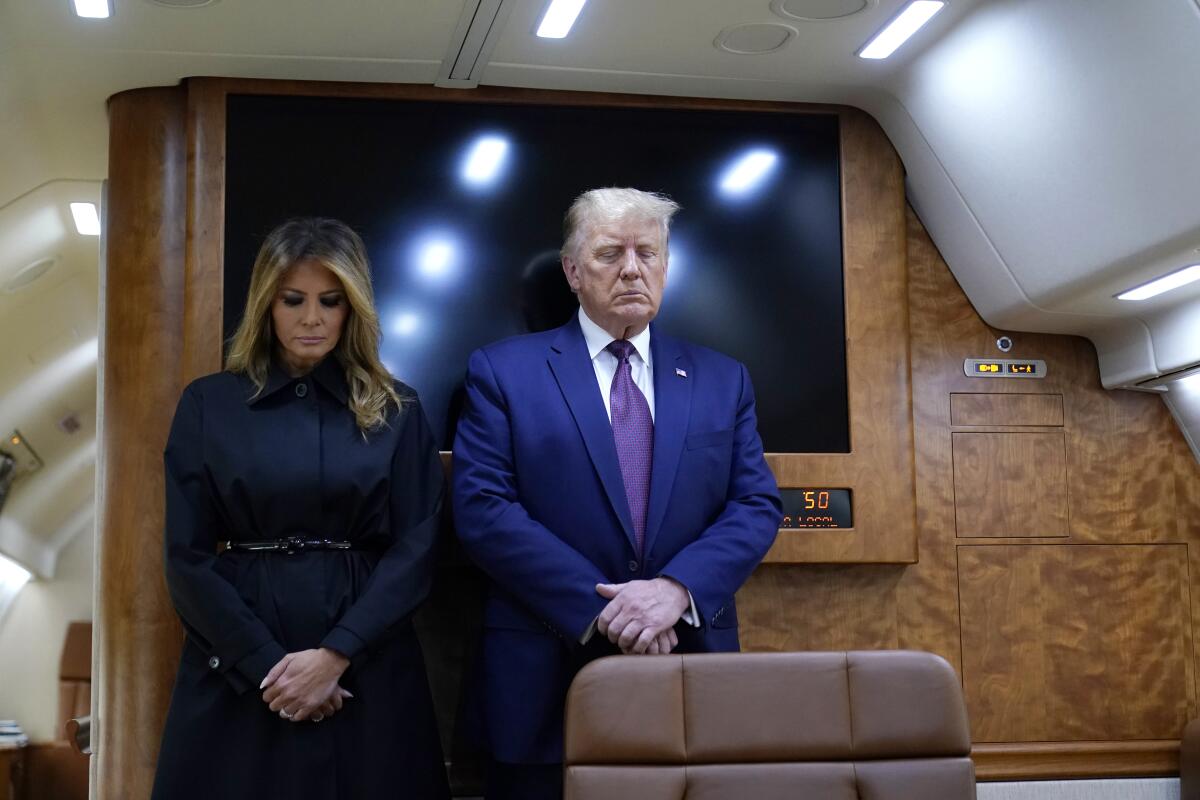Bahrain moves toward normalizing relations with Israel

- Share via
WASHINGTON — The tiny Persian Gulf nation of Bahrain has agreed to begin efforts to normalize ties with Israel, the Trump administration announced Friday.
The three countries released a joint six-paragraph statement saying Bahrain “agreed to establish full diplomatic relations.”
Bahrain joined the United Arab Emirates as the first Gulf countries expressing willingness to end their long-standing refusal to recognize Israel. Only Egypt and Jordan currently have diplomatic ties with Israel, with the rest of the Arab world demanding the Israeli government must first come to a peace agreement with the Palestinians before normalization.
Bringing the UAE and Bahrain into the fold is part of a broader effort by the Trump administration to drive a wedge between the Palestinians and their Arab supporters, to isolate the Palestinians and further erode their standing. Trump has been pushing a plan to settle the conflict between Israelis and the Palestinians that is widely seen as overly favorable to Israelis and has been rejected by the Palestinian leadership.
It was not clear how far the Bahrain agreement goes. President Trump exaggerated the reach of the UAE deal when he announced it earlier this month, with UAE officials saying it only bound them to finding a “road map” toward normalization with Israel as opposed to the immediate opening of full diplomatic relations.
Trump portrayed the arrangements with Bahrain and the UAE as “historic peace deals,” although neither country was at war with Israel. He said it was significant to announce the agreement on the 19th anniversary of the 9/11 terror attacks, which were carried out primarily by Saudi militants.
Trump announced Friday’s agreement, he said, after a three-way phone conversation with Israeli Prime Minister Benjamin Netanyahu and Bahrain’s King Hamad bin Isal Khalifa. A Bahrain representative will join Trump, Netanyahu and the foreign minister of the UAE for a signing ceremony Tuesday at the White House. The crown prince of the UAE, Mohammed bin Zayad, de facto ruler of the emirates, declined to attend.
Jared Kushner, Trump’s son-in-law and point man on the Middle East, said he believed the developments with Bahrain and the UAE would “reduce tensions” in the region and allow Arab states to “separate” their national interests from those of Palestinians. He said he was confident there was a momentum in the direction of broader recognition of Israel.
However, the Bahraini foreign minister, Abdullatif bin Rashid Zayani, later interjected a note of caution. He said the deal with Israel “will help strengthen regional security and stability — including achieving the legitimate rights of the Palestinian people.”
The UAE agreed to work toward ties with Israel based on two major concessions. Washington agreed to sell an undisclosed number of F-35 stealth fighter jets to the Emiratis and Israel agreed to halt the annexation of large parts of the West Bank claimed by Palestinians. (Netanyahu later said the halt was only temporary and voiced opposition to the sale of the fighter jets — more signs of the distance that remains between the signed agreements and facts on the ground.)
Kushner would not say what concessions had been made to Bahrain, a country of 1.5 million people which has a less robust military partnership with Washington but nevertheless hopes to buy weapons. The U.S. Congress has opposed such sales to Bahrain because of its abysmal human rights record.
Kushner and Secretary of State Michael R. Pompeo made separate trips to the region in recent weeks attempting to persuade other Arab countries to follow the UAE. Most refused. Only Bahrain agreed, acting with the consent of Saudi Arabia, experts said, because Riyadh, as custodian of the most holy sites in Islam, is loath to join in.
Arab countries with sizable populations of people who would protest the perceived betrayal of Palestinians would find it politically untenable to recognize Israel without progress toward a viable and sovereign Palestinian state.
By contrast, both the UAE and Bahrain are monarchies that can more easily repress any domestic opposition.
“This one is totally expected. Bahrain could very easily have gone before UAE,” Jonathan Schanzer, head of research at the Foundation for the Defense of Democracies, said on Twitter. “The next one (assuming more are coming) will be more of a wild card.”
Thomas Warrick, a Middle East expert at the Atlantic Council, a Washington think tank, said the actions in detente by the UAE and Bahrain are “as much due to their well-founded concerns about their Iranian neighbor to the north as to their recognition of the strategic relationship that both have with the United States.”
The Palestinian Authority, as it did with the UAE agreement, reacted with anger. The Bahrain deal is a “betrayal” of Jerusalem and “the Palestinian cause,” as well as a “step that supports the legalization of Israel’s ugly crimes against the Palestinian people.”
The Trump administration has also worked to build common cause among several Sunni-dominated Persian Gulf and Arab states, plus Israel, in opposition to predominantly Shiite Iran, a longtime rival accused by the U.S. and others of supporting militant groups throughout the region.
More to Read
Get the L.A. Times Politics newsletter
Deeply reported insights into legislation, politics and policy from Sacramento, Washington and beyond. In your inbox twice per week.
You may occasionally receive promotional content from the Los Angeles Times.












